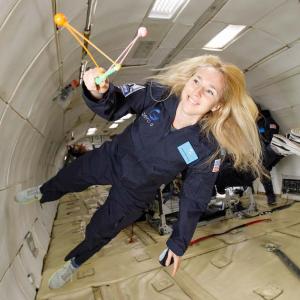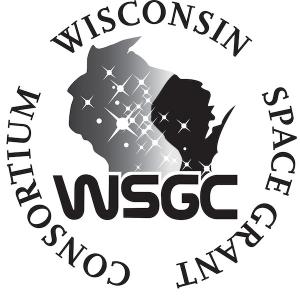
Health - Trend Magazine originally published at Health - Trend Magazine

Embedded Teacher Victoria Obenchain flies with ZERO-G in November 2021.

NASA Wisconsin Space Grant Consortium
Four teachers from across the country have been selected to fly microgravity experiments aboard a modified aircraft that creates periods of weightlessness.
— Laura Tomlin
KENOSHA, WISCONSIN, USA, April 7, 2022 /EINPresswire.com/ — Four teachers from Georgia, Iowa, Texas, and Wisconsin, have been selected to serve as “Embedded Teachers” with the Carthage College Microgravity Team. The Embedded Teacher Program is a partnership between the Wisconsin Space Grant Consortium, the National Space Society, and the Zero Gravity Corporation (ZERO-G).
The teachers and their experiments will each experience eleven minutes of weightlessness during a series of two-hour flights aboard the ZERO-G G-Force One aircraft. Thirty parabolas are executed during each flight. The parabolas allow the researchers to float in free-fall during the maneuvers, which each last about 22-24 seconds.
The Teachers:
Becky Busby, Gifted Specialist at Frank Long Elementary School in Hinesville, Georgia, is flying two experiments designed to study life-saving medical techniques in space and the use of PCR tests for water contamination in spacecraft. Her projects have engaged a wide and diverse cross-section of the school and its surrounding community. Busby has already involved over 700 students in her work on these projects through presentations, direct engagement with the research, and outreach. Ms. Busby’s experiment on water contamination measurements aboard spacecraft is in collaboration with the Genes in Space program.
Ronda McCarthy, a science teacher at St. Theresa Catholic School in Des Moines, Iowa, is using her flight to examine the effects of capillary forces in liquids. She will recreate a 2013 demonstration performed by Astronaut Chris Hadfield on the International Space Station. Hadfield’s demonstration has long been a student favorite and is used to show how differently liquids behave in space. McCarthy will also perform an experiment by Astronaut Don Pettit. In the latter experiment, small droplets of water in the presence of an electrically charged needle execute orbits around the needle, like planets orbiting a star. The demonstration helps students understand the nature of electrical forces in analogy to the force of gravity. More than 600 students are engaged in her flight experience, including 523 students across Iowa who sent in suggestions for experiments or helped design her final experiments.
Laura Tomlin, a sixth-grade science teacher at Salado ISD in Salado, Texas, comes to teaching from a career as a research biologist studying crops and pests of the California and Arizona agricultural systems. Ms. Tomlin is flying two primary experiments. One is designed to investigate how water transport in lunar and Martian soils (regolith) is affected by the different gravity levels on these bodies. The second experiment studies whether the microgravity environment suppresses enzyme function in the liver, possibly leading to liver damage on long-term spaceflight.
Lisa Werner serves as Band Director at St. Bruno Parish School in Dousman, Wisconsin, Senior Symphony Orchestra Manager at the Milwaukee Youth Symphony Orchestra, and Jazz Ensemble Director at Kettle Moraine High School in Wales, Wisconsin. Ms. Werner will carry out experiments designed to measure her ability to perform precise manual tasks such as keeping beat and responding to tempo signals in a weightless environment. She will also carry out a demonstration that will allow students to visualize sound waves using the free-float environment of the parabolic flight. Finally, data from the flight will be used by Werner’s students to arrange an orchestral piece of music for performance after the flights.
“I am beyond excited to get to experiment with sound and music in zero gravity, but above all else, I can’t wait for my students to take the scientific data from my flight and turn it into a piece of music to perform at our spring concert just days after my return.”
The NASA WSGC Embedded Teacher program has flown eight teachers and their experiments over the past seven years. Each teacher works with Carthage Professor Kevin Crosby to develop their experiments for flight, but the ideas for the experiments often come from the hundreds of students involved in each teacher’s project. The teachers will bring the lessons and experiences of the program back to their classrooms to motivate students to pursue their own journeys in STEAM (Science, Technology, Engineering, Arts, and Mathematics).
Ms. Tomlin captured the experience of working on her project and the impact on her students.
“The project has required critical thinking, communication, and creativity, giving students a better understanding of the scientific and engineering process. Enthusiasm for this project continues to grow with each accomplishment. A young girl remarked that she ‘did not even know’ she liked science, and now wants to work at NASA one day.”
The program invites applications from K-12 teachers in STEAM fields to attend a microgravity workshop on the campus of Carthage College. Workshop participants will be invited to develop their own proposals for flight as part of the Embedded Teacher Project. More information on the workshop is available on the WSGC site Applications are now open.
About WSGC: The Wisconsin Space Grant Consortium (WSGC) is part of a national network of consortia funded by NASA’s National Space Grant College and Fellowship Program. Congress established the program in 1988 to contribute to the nation’s scientific enterprise through research, education, and public service projects.
About Carthage College: Carthage College is raising expectations for a private college experience. It blends the best liberal arts traditions with desirable degree programs, transformative learning opportunities, personal attention from distinguished faculty, and a focus on career development, which makes its graduates competitive in the workforce. Founded in 1847, Carthage College is located on an idyllic shore of Lake Michigan in Kenosha, Wisconsin, in the thriving corridor between Milwaukee and Chicago. Grow with Carthage: www.carthage.edu
About ZERO-G: Zero Gravity Corporation is a privately held space entertainment and tourism company whose mission is to make the excitement and adventure of space accessible to the public. ZERO-G is the first and only FAA-approved provider of weightless flight in the U.S. for the general public; entertainment and film industries; corporate and incentive markets; non-profit research and education sectors; and the government. ZERO-G’s attention to detail, excellent service and quality of experience combined with its exciting history has set the foundation for the most exhilarating adventure-based tourism. For more information about ZERO-G, please visit www.gozerog.com.
Kevin Crosby
Carthage College
email us here
Visit us on social media:
Facebook
Twitter
LinkedIn
Other
2022 Embedded Teacher Program Invites Applications
![]()
Health - Trend Magazine originally published at Health - Trend Magazine


 ,
,